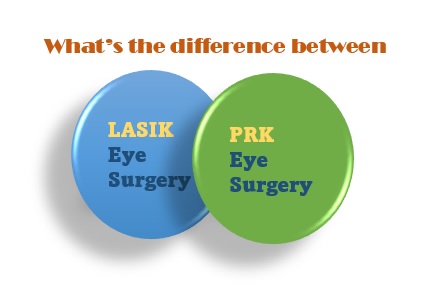When it comes to cutting-edge advancements in vision correction, LASIK and PRK stand at the forefront of modern eye surgeries. Both provide life-changing solutions for refractive errors: myopia (nearsightedness), hyperopia (farsightedness), and astigmatism. Which candidate is best for which vision improvement technology: LASIK vs. PRK? This article provides easy and understandable insights into the difference between LASIK and PRK eye surgery.
“LASIK vs. PRK: Common Features and Differences”
Both surgeries are based on laser procedures and focus on reshaping the cornea to improve vision. The goal of two surgeries is to reduce or eliminate dependency on glasses or contact lenses. However, there is a slight difference in procedures performance.
- LASIK involves creating a thin flap in the cornea’s surface, lifting it, and using a laser to reshape the underlying tissue. The flap is then repositioned, acting like a natural bandage.
- PRK, on the other hand, removes the cornea’s outer layer (the epithelium) entirely before reshaping the cornea with a laser. The epithelium grows back naturally over time.
The Recovery Experience: A Key Difference
One of the most significant differences between LASIK and PRK lies in the recovery process. If you’re someone who values quick results, LASIK might feel like an obvious choice. Most LASIK patients notice improved vision almost immediately, with minimal discomfort. You could be back to your daily routine within a day or two.
PRK, however, requires a bit more patience. Since the outer layer of the cornea needs time to regenerate, recovery can take several days to a week. In the meantime, patients might feel mild discomfort, light sensitivity, and blurry vision. But this must not be a discouragement, as PRK has far-reaching advantages.
LASIK vs PRK: Who is the best candidate?
LASIK and PRK are different types of eye surgeries performed in different circumstances based on eye health, lifestyle, pain tolerance, recovery expectation, and personal preferences. All these factors play a vital role in determining a specific procedure. The doctor can proficiently determine the procedure; however, specific differences are discussed here:
Choose LASIK if:
- You want quick recovery and minimal discomfort.
- Your corneal thickness is sufficient.
- You are not involved in high-impact sports.
- You want stable and predictable outcomes with a faster return to normal activities.
Choose PRK if:
- You have thin corneas or an irregular corneal shape.
- You engage in contact sports or physically demanding jobs.
- You are okay with a longer recovery and some discomfort.
- You have a higher prescription, as PRK is sometimes preferred for extreme refractive errors.
Are LASIK and PRK Results Long-Lasting?
Yes, PRK vs. LASIK results are long-term and effective (Suphi, et al., 2022). Most people achieve 20/20 or better results in their vision permanently. People enjoy clear vision for years to come. However, it is worth mentioning that both LASIK and PRK cannot stop presbyopia, an age-related condition that causes difficulty in focusing on a nearby object in the early 40s.
Choosing LASIK vs PRK: A Consultation with Your Ophthalmologist
First of all, make an appointment with a qualified ophthalmologist who will evaluate your eyes. After the examination, the doctor will recommend the best option according to your medical circumstances. If there is suitability for both types of surgeries, the ophthalmologist asks your concern to proceed with which type of surgery. Are you comfortable with a slightly longer recovery? Or do you want quick results and minimal downtime? These are questions only patients can answer.
LASIK vs PRK: A Side-by-Side Comparison
| LASIK Eye Surgery | PRK Eye Surgery | |
| Procedure | Numbing drops are applied to the eye. | Numbing drops are applied. |
| A femtosecond laser or microkeratome creates a thin corneal flap. | The surgeon removes the epithelium using an alcohol solution, brush, or laser. | |
| The surgeon lifts the flap and uses an excimer laser to reshape the underlying corneal tissue. | The surgeon uses an excimer laser to reshape the cornea. | |
| The flap is repositioned without the need for stitches. | A protective contact lens is placed over the eye to aid healing. | |
| The healing starts immediately as the surgery ends. Patients achieve improved vision within 24 hours. | The epithelium regenerates over 3–5 days, and full vision improvement may take several weeks. | |
| Advantages | Fast recovery: Most patients achieve the best result within a day. | No flap complications—Since there is no flap, issues like flap dislocation or irregular healing are avoided. |
| Minimal discomfort—The corneal flap protects nerve endings, reducing post-surgery pain. | Better for thin corneas—suitable for patients with thin or irregular corneas. | |
| Long-term results: Provides stable vision correction for years. | Less risk of dry eyes compared to LASIK. | |
| High success rate: More than 96% of patients achieve 20/20 vision or better. | Better for athletes or high-impact activities: No risk of flap displacement in contact sports or physical work. | |
| Corneal haze is minimal as compared to PRK. | Corneal haze is maximum and more common but treatable. | |
| Disadvantages | Flap complications—Risks such as flap dislocation or infection can occur. | Longer recovery time—vision may be blurry for several days to weeks. |
| Not suitable for thin corneas—The flap creation process requires sufficient corneal thickness. | More discomfort—pain and sensitivity—lasts a few days as the epithelium regenerates. | |
| Dry eye syndrome—Can cause temporary or persistent dryness in some patients. | Risk of corneal haze—Some patients experience corneal haze, especially in high-prescription corrections. | |
| Higher cost—Typically more expensive than PRK. | Slower visual improvement —It can take several weeks to months for final vision clarity. |

